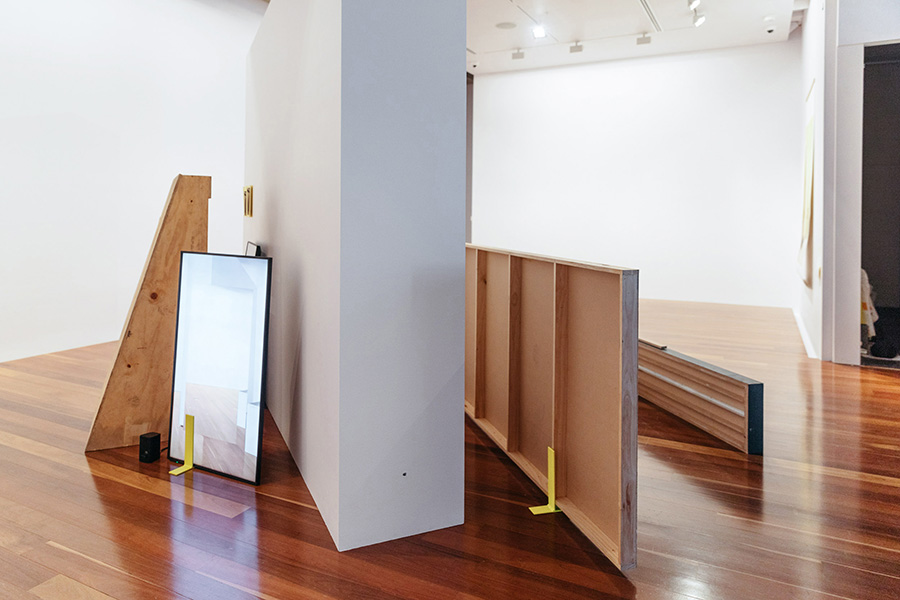Grogan’s considered four-dimensional installations employ the authority of the unseen—utilising voids, negative spaces and absences—to convey images and ideas as viewers’ interactions are carefully choreographed through the gallery.
Helen GROGAN, SET AND DRIFT (as 3-4 constellations for Samstag Museum), 2020, installation view, from the exhibition 2020 Adelaide//International, 2020, at Samstag Museum of Art, University of South Australia. Photograph by Sia Duff. Courtesy of Samstag Museum of Art.
HELEN GROGAN
Helen Grogan’s (b. 1979) time-based moving image and sound installations invite curiosity, speculation and embodied engagement. Their purposeful enquiry into what is constructed and what pre-exists within the gallery, archive and museum, draws our attention to the often-unseen structures and processes of power underlying the everyday norms of cultural institutions.
Inverting audience assumptions, Concrete Room (2003), first developed within their training in choreography at Amsterdam’s School for New Dance Development, has since been presented in many contexts. Expecting a solo dancer, viewers were instead immersed in a live soundscape, with Grogan’s microphone tracing and amplifying the site’s internal perimeter. Exposing unnoticed elements such as power points or hidden doors, what seemed to be an empty neutral room revealed itself as a space actively controlling its usage.
Currently based in Naarm/Melbourne, Grogan’s work is informed by studies in choreography, philosophy and curation with two decades of rigorous practice across global visual and performing art sectors. Their precisely considered four-dimensional installations also employ the authority of the unseen—utilising voids, negative spaces and absences—to convey images and ideas as viewers’ interactions are carefully choreographed through the gallery.
SET AND DRIFT (3-4 constellations for Samstag Museum of Art) (2020), recalls the bodily experience of virtual reality realms, where a work is only activated by the viewer's presence. Disparate and disassembled objects—fire extinguishers, half-unboxed screens, safety tape, barricades caressing empty gallery walls—suggest a sophisticated puzzle. There is a faint awareness that, just as in gamespace, we are being directed by subtle prompts along predestined pathways to encounter a succession of perspectives.
Like many of their time-based interventions, the exhibition was reconfigured several times over its duration, urging viewers to savour the corporeal and intellectual stimulation of the process rather than draw fixed conclusions. Using relation research strategies—working on site alongside institutions, with their staff, processes and narratives as subjects—has focused Grogan’s attention on the ethics and politics of access and representation. In turn, they have built relationships with allies across the globe.
Their current work in progress, Witness Report (2023), evolved from a four-week research residency looking at the cultures and processes of care within Amsterdam’s de Appel Archive. During that summer, the organisation was preparing to relocate its 50 years of experimental and ephemeral practice archives to a new facility. Contextualising the Archive as a place rather than a repository of discrete records, Grogan literally situates us within archival holdings through field recordings of its unremarkable office space.
Documents rustle, photocopiers hum; outside the window, cranes groan and children squeal in their playground—experiences randomly recalibrated into data-driven moving image. This poetic artwork, a perpetual present that can never be repeated, highlights how archives embody living cultures. Enabling an understanding of past values and ethics while connecting with current methods and techniques, an archive is a gentle gift to future generations.
Aligned with New York City’s nuanced perspective of documentary film and history of overlapping video and performance art, activism and experimental film, their study plan follows research and engagement with The Kitchen’s living archive (2023 - ongoing). By focusing on the intersections of time-based practice, archival/documentary strategies and ethics, Helen Grogan is on a mission to extend the agency, impact and cultural significance of critical documentation art.
Essay written by Melinda Rackham, September 2024.
Melinda Rackham writes on art, artists, feminisms and adoption. An Adjunct Research Professor at UniSA Creative, her latest book CoUNTess: Spoiling Illusions since 2008 (2023) was co-authored with Elvis Richardson. Rackham lives and works in Tarntanya/Adelaide.

